Gordon Boys' Orphanage and Home, Dover, Kent
The Gordon Boys' Orphanage and Home in Dover was founded in 1885 by local philanthropist Thomas Blackman. It was named after General Charles George Gordon who had recently died in the siege of Khartoum, and was one of several boys' homes to commemorate him in this way. The home was located at 56 St James' Street, Dover, and was managed by its founder. It accepted boys from all parts who had lost one or both parents, or who were judged to be 'thoroughly deserving or destitute'. The establishment could accommodate around 50 boys, aged from 8 upwards, who remained until they could earn their own living. Admissions were free although weekly contributions were expected where circumstances allowed. Like most institutions of its type, the home largely relied on subscriptions, donations and legacies to support its operation.
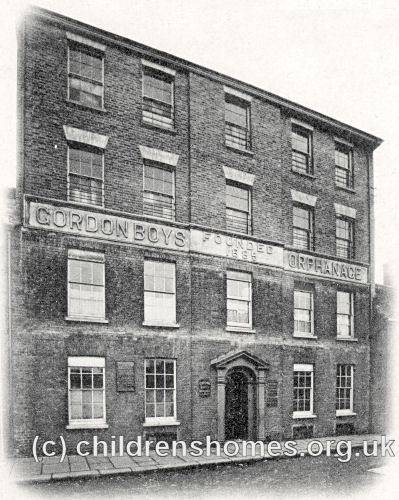
Gordon Boys' Orphanage, Dover, early 1900s. © Peter Higginbotham
The daily routine of the house in winter began at 7 a.m. when every boy had work to do. Breakfast was followed at 9.30am by prayers and then school until 12.30. After dinner they had a walk from 2 to 3 p.m. and in summer they had cricket. Each boy could receive up to 30 marks each week for conduct.
At a prize-giving ceremony in 1888, the awards were as follows:— Spelling: 1st prize, William Rowson; 2nd class, Robert Graham; 3rd class, William Clarke; 4th class, David Powell. Arithmetic: 1st prize, W. Maurice Gobby; 2nd class, Henry Brown; 3rd class, Alfred Clayton; 4th class, James Beard. Writing: 1st prize, W. A. Simms; 2nd class, Robert Graham; 3rd class, Harry Corford. Conduct: 1st prize, William Bigoe, £1 1s., Walter Charles Hyde; 2nd class, Fred. Stone; 3rd class, Henry Brown Birmingham; 4th class, David Powell. Divinity: 1st prize, Maurice Gobby; 2nd class, Robert Graham; 3rd class, Herbert Fox, 4th class James Beard. Housework: 1st prize, Harold Cootes; 2nd class, Charles Seymour; 3rd class William J. P. Cowden. Drill: 2nd class, Maurice Gobby; 3rd class, Charles Yale. English History: 1st prize, William Rowson; 2nd class, Yale; 3rd class, Charles beach. Geography: 1st prize, William Simms; 2nd class, Sam Woolley; 3rd class, Bertie Fox. French: 1st prize William Rowson. Composition: 1st prize, Walter Hyde; 2nd class, Ernest Yale; 3rd class, Maurice Gobby; 4th class, W. A. Simms. Needlework: 1st prize, Thomas Latham; 2nd class, Frank Haynes; 3rd class, Harold Coats; 4th class, Thomas Evans. Pupil Teachers: 1sst prize, Maurice Gobby; 2nd class, William Rowson. Singing: 1st prize, William Simms; 2nd class Maurice Gobby. Band: Robert Graham; Thomas Latham; Walter Maurice Gobby. Good Work: Thomas Evans; Edward Strong; William Cowdery, Richard Wilson, and John Wilson.
A prominent part of the home's activities was its Drum and Fife Band who, adopting the Gordon tartan, performed in full Scottish regalia and regularly gave concerts in the area.
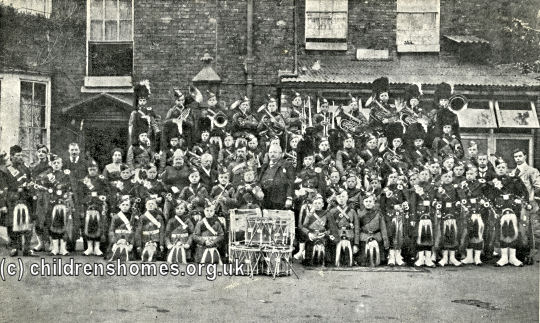
Gordon Boys' Orphanage band, Dover, early 1900s. © Peter Higginbotham
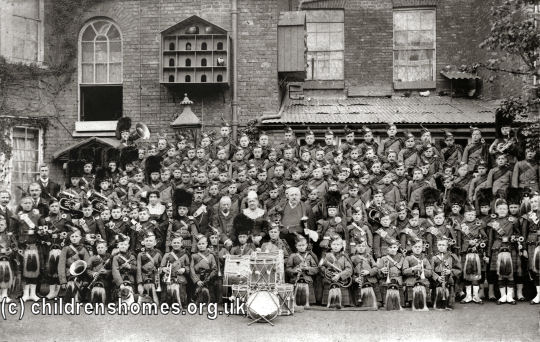
Gordon Boys' Orphanage band, Dover, early 1900s. © Peter Higginbotham
On occasion, the band even crossed the English Channel to perform and, as noted in the picture below, were presented with a medal and French flag by the city of Dunkirk.
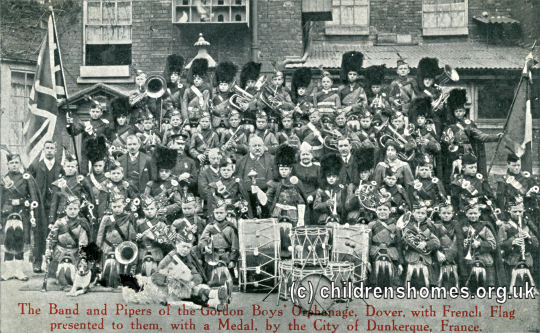
Gordon Boys' Orphanage band, Dover, early 1900s. © Peter Higginbotham
The home also boasted a team of hand-bell ringers, while some members of the band could give a display of Highland sword dancing.
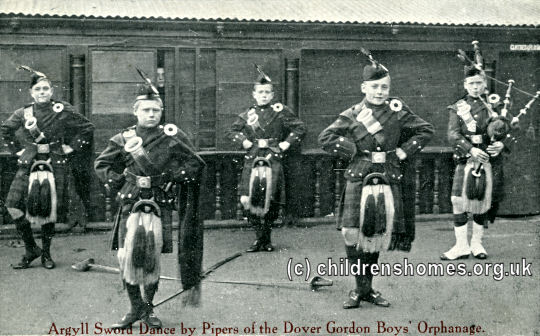
Gordon Boys' Orphanage sword dancers, Dover, early 1900s. © Peter Higginbotham
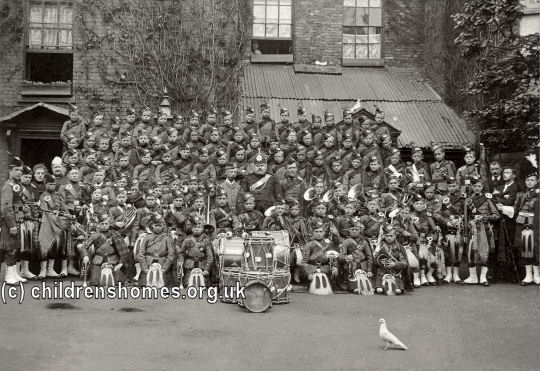
Gordon Boys' Orphanage band, Dover, early 1900s. © Peter Higginbotham
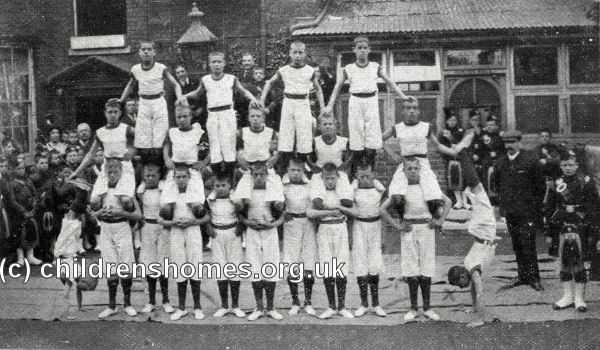
Gordon Boys' Orphanage gymnastics display, Dover, c.1909. © Peter Higginbotham
In 1911, there was an outbreak of the highly contagious eye disease trachoma amongst the boys. The home's poor handling of the situation, which included a proposal to dismiss all the boys to their homes or to relatives, with no guarantee that they were free from infection, even led to questions being asked in the House of Commons.
Thomas Blackman died in February 1921. At his funeral, the cortege was headed by pipers from the home playing 'Lochaber No More'. The floral tribute from the boys was in the form of the home's cap badge in red, white and blue flowers, with some Gordon tartan attached.
A Boy Scout troop was formed at the home in 1938.
The orphanage is believed to have closed at the outbreak of the Second World War in 1939. The buildings no longer survive.
Records
Note: many repositories impose a closure period of up to 100 years for records identifying individuals. Before travelling a long distance, always check that the records you want to consult will be available.
- Kent History and Library Centre, James Whatman Way, Maidstone, Kent ME14 1LQ Holdings consist of reports, correspondence etc.
Bibliography
- Higginbotham, Peter Children's Homes: A History of Institutional Care for Britain s Young (2017, Pen & Sword)
Links
- None identified at present.
Except where indicated, this page () © Peter Higginbotham. Contents may not be reproduced without permission.


